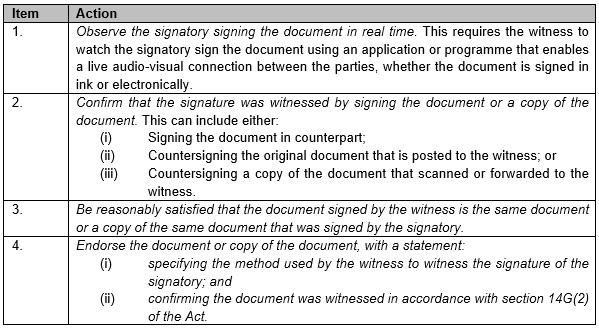Remote Witnessing in NSW
The ongoing effects of COVID-19 in the workplace are increasingly apparent, particularly in the corporate sector. Companies who once enforced stringent policies and procedures to govern the way in which staff perform their day-to-day activities, have been forced to reevaluate their methods. Something once as simple as witnessing a signature on a legal document, is now a far less achievable undertaking in many instances.
With that said, the Government has recognised the necessity of electronic signatures for legal documents, taking great steps towards the introduction of appropriate legislation in recent months, in order to regulate e-signing of documents. As discussed previously in:
- Can I sign this electronically?;
- Online onboarding of corporate borrowers and guarantors in Australia: Financiers will soon have additional comfort about due execution assumptions;
- Creating deeds in electronic form: why we should not be deterred by the ghosts of the past; and
- Opened up in lockdown
More recently, in November 2021, the Government passed a Bill regulating the remote witnessing of legal documents in NSW.
Significance of the Bill
In April 2020, the Government enacted temporary remote witnessing measures as part of the response to the COVID-19 pandemic. After what Attorney General, Mark Speakman described as a “successful trial period of 18 months”, the Government has introduced the Electronic Transactions Amendment (Remote Witnessing) Bill 2021 (the Bill), which passed both houses of Parliament on Tuesday, 16 November 2021. Once the Electronic Transactions Amendment (Remote Witnessing) Act 2021 receives assent, it will permanently allow documents to be witnessed remotely over audio-visual link in NSW.
Remote witnessing of documents in NSW
Several requirements have been devised for a person witnessing the signing of a document remotely. The requirements have been concisely outlined in the table below and are stipulated in Section 14G(2) of the Electronic Transaction Act 2000 (the Act). When witnessing a document remotely, the witness must:

The Bill makes it clear that a witness does not need to be located in NSW to witness the signing of a document (new section 14I) and regardless of where the witness is located at the time of signing, the document will be taken to have been executed in NSW if the signatory was located in NSW at the time he or she signed the document (new section 14J).It is important to note that while the legislation does not impose a time limit for the witness to sign the document or a copy of the document, section 14G(3) of the Act provides that a counterpart or copy of the document should be signed “as soon as practicable after witnessing the signing of the document“.
Conclusion
The permanent enactment of the remote witnessing of documents in NSW will provide greater flexibility for individuals and businesses, particularly those that are living or trading in regional, rural and remote areas. Although the remote witnessing regime may be favoured when witnessing and executing documents, the traditional methods of signing and witnessing documents in person are still available. In addition, existing safeguards in other legislation will continue to apply when witnessing documents remotely, including certification and verification of identity requirements.
Queries
If you have any questions about this article, please get in touch with an author or any member of our Banking & Finance team.
Disclaimer
This information and the contents of this publication, current as at the date of publication, is general in nature to offer assistance to Cornwalls’ clients, prospective clients and stakeholders, and is for reference purposes only. It does not constitute legal or financial advice. If you are concerned about any topic covered, we recommend that you seek your own specific legal and financial advice before taking any action.
